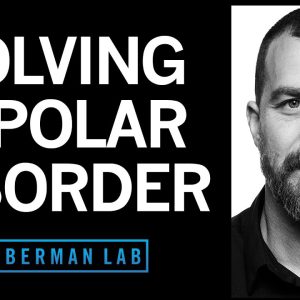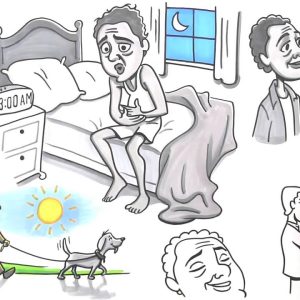In this episode, I explain the biology, symptoms, causes and types of bipolar disorder (sometimes called bipolar depression). I discuss neuroplasticity and how the brain normally regulates mood, energy, and perceptions; then, I contrast that with the biology of bipolar disorder, which is characterized by extremes of energy and mood, e.g., mania and depression. I outline the mechanisms through which bipolar disorder manifests in the brain, including deficits of interoception and reduced connections between the parietal and limbic systems. I also outline how treatment options (such as lithium) work in part through homeostatic plasticity.’ I discuss not only lithium but also the treatment of bipolar with ketamine, different talk therapies, electroconvulsive therapy, transcranial magnetic stimulation, and nutraceuticals, including Omega-3 and Inositol supplementation. This episode should interest anyone who has or knows someone with bipolar disorder and, more broadly, those interested in how the brain works to create a balance between thoughts, energy levels, focus, and mood.
#HubermanLab #Bipolar #BipolarDisorder
Thank you to our sponsors
InsideTracker: https://insidetracker.com/huberman
ROKA: https://www.roka.com/huberman
Blinkist: https://www.blinkist.com/huberman
Supplements from Momentous
Huberman Collection
Social & Website
Instagram – https://www.instagram.com/hubermanlab
Twitter – https://twitter.com/hubermanlab
Facebook – https://www.facebook.com/hubermanlab
TikTok – https://www.tiktok.com/@hubermanlab
Website – https://hubermanlab.com
Newsletter – https://hubermanlab.com/neural-network
Subscribe to the Huberman Lab Podcast
Apple Podcasts: https://apple.co/3thCToZ
Spotify: https://spoti.fi/3PYzuFs
Google Podcasts: https://bit.ly/3amI809
Other platforms: https://hubermanlab.com/follow
Full show notes & links to peer-reviewed articles: https://hubermanlab.com/the-science-and-treatment-of-bipolar-disorder
Timestamps
00:00:00 Bipolar Disorder
00:02:23 Momentous Supplements
00:03:42 Tool: Appetite Suppression & GLP-1, Parallel Pathways, Yerba Mate
00:10:23 InsideTracker, ROKA, Blinkist
00:14:24 Prevalence & Severity of Bipolar Disorder
00:16:30 Bipolar Disorder I, Diagnostic Criteria of Mania
00:28:58 Bipolar Disorder II, Individual Variability
00:33:07 Bipolar I vs. Bipolar II: Manic, Depressive & Symptom-Free States
00:38:20 Consequences of Bipolar Disorder, Heritability
00:46:53 Bipolar Disorder vs. Borderline Personality Disorder
00:51:51 Mania & Depression, Negative Impacts
00:53:06 History of Lithium Treatment
01:02:44 Lithium Treatment & Side-Effects
01:05:05 Effects of Lithium: BDNF, Anti-inflammatory & Neuroprotection
01:10:10 Neural Circuits of Bipolar Disorder, Interoception, Hyper- vs. Hypoactivity
01:17:11 Neural States & Mania, Parietal Lobe & Limbic System
01:22:58 Homeostatic Plasticity, Synaptic Scaling, Lithium & Ketamine
01:36:00 Talk Therapies: Cognitive Behavioral Therapy, Family-Focused Therapy, Interpersonal & Social Rhythm Therapy
01:43:18 Electroconvulsive Therapy (ECT), Transcranial Magnetic Stimulation (rTMS)
01:48:01 Psylocibin, Cannabis
01:51:50 Lifestyle Support, Supplements: Inositol & Omega-3 Fatty Acids
02:03:31 Omega-3s, Membrane Fluidity & Neuroplasticity
02:06:44 Mania, Creativity & Occupations
02:15:33 Bipolar Disorder: Diagnosis, Neural Circuits & Treatment
02:17:45 Zero-Cost Support, YouTube Feedback, Spotify & Apple Reviews, Sponsors, Momentous Supplements, Instagram, Twitter, Neural Network Newsletter
The Huberman Lab Podcast is for general informational purposes only and does not constitute the practice of medicine, nursing or other professional health care services, including the giving of medical advice, and no doctor/patient relationship is formed. The use of information on this podcast or materials linked from this podcast is at the user’s own risk. The content of this podcast is not intended to be a substitute for professional medical advice, diagnosis, or treatment. Users should not disregard or delay in obtaining medical advice for any medical condition they may have and should seek the assistance of their health care professionals for any such conditions.
Title Card Photo Credit: Mike Blabac – https://www.blabacphoto.com



